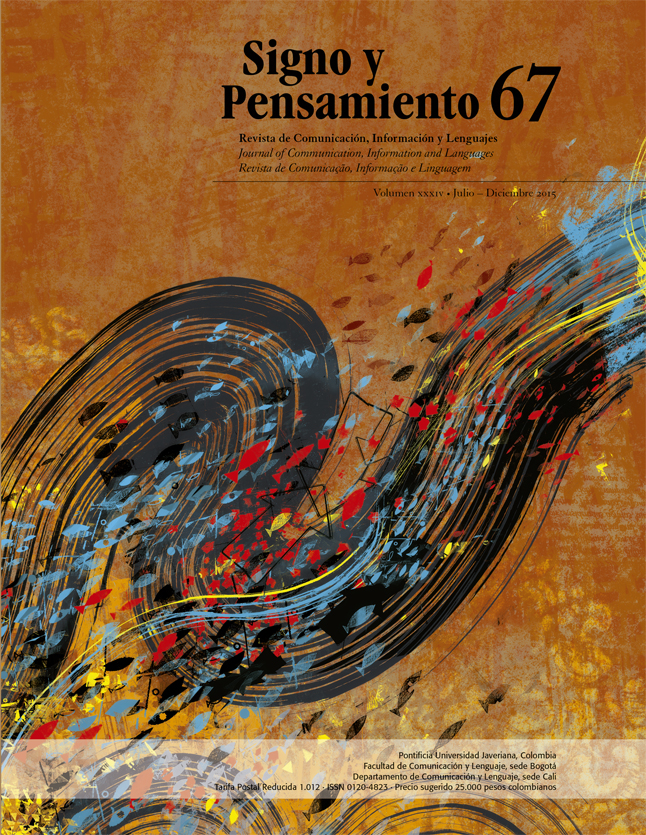Abstract
This research draws on agenda-setting studies developed in different cuban universities, for a characterization of the media and public agendas in Santiago de Cuba from 2011 to 2014. It is a longitudinal case study, using an approach combined research based on quantifiable data.
Its main contributions show the cyclical nature of the media agenda and the public agenda synchronous; and the development of two methodological approaches to assess both agendas in Cuban territorial context. Theoretical methods were used as the analysis-synthesis, deductive and inductive grounded theory and research techniques as the Spearman correlation coefficient and analysis of content.
Cabrera, E. (2014). Un estudio sobre la correspondencia entre la agenda pública de un grupo de cuentapropistas habaneros y la de medios nacionales en torno a la Actualización del Modelo Económico y Social Cubano. (Tesis inédita de licenciatura). Universidad de La Habana, Cuba.
Caballero, D. (2015). De lo real a la agenda pública. Influencias de las condiciones contingentes en el proceso de formación de la agenda pública en el municipio Santiago de Cuba. (Tesis inédita de licenciatura). Universidad de Oriente, Cuba.
Cardoso, L. (2014). Estudio del proceso de construcción de la agenda mediática de la revista informativa En Primer Plano de Telecristal. (Tesis inédita de licenciatura). Universidad de Holguín, Cuba.
Casermeiro, A. (2004). Los medios en las elecciones: la Agenda Setting en la Ciudad de Buenos Aires. Argentina: Educa.
Castro, D. (2014). Agenda-setting e Internet: tendências e perspectivas de pesquisa. (Tesis inédita de maestría). Universidad de Brasilia, Brasil.
Colunga, M. (2011). Mediaciones sobre el contenido de los medios que inciden en la relación entre la agenda mediática del periódico Adelante y la agenda pública de sus lectores potenciales. (Tesis inédita de licenciatura). Universidad de Camagüey, Cuba.
Gallego, J. R. y Rosabal, A. (2013). Las cartas sobre la mesa: un estudio sobre la relación entre agenda pública y mediática en Cuba: caso Granma. Signo y Pensamiento, 32(62), 98-113.
Gallego, J. R. (2014). La larga busca: propuesta de diseño para un análisis metateórico. (Tesis inédita de maestría). Universidad de La Habana, Cuba.
Guo, L., Vu. H.T. y McCombs, M. (2012). An Expanded Perspective on Agenda- Setting Effects. Exploring the third level of agenda setting. Revista de Comunicación, 11, 51-68.
Kligler-Vilenchik, N., Tsfati, Y. y Meyers, O. (2014). Setting the collective memory agenda: Examining mainstream media influence on individuals’ perceptions of the past. Memory Studies, 7(4), 484-499.
McCombs, M. (1972). The Agenda-Setting Role of the Mass Media in the Shaping of Public Opinion. Public Opinion Quarterly, 36, 179-187.
McCombs, M. (2006). Estableciendo la agenda. El impacto de los medios en la opinión pública y el conocimiento. España: Paidós.
McCombs, M. y Stroud, N. J. (2014). Psychology of Agenda-Setting Effects. Mapping the Paths of Information Processing. Review of Communication Research, 2(1), 68-93.
Muñiz, V. (2013). Viaje al centro de la agenda. Influencias en la construcción de las agendas mediáticas de los órganos de prensa provinciales en Santiago de Cuba. (Tesis inédita de licenciatura). Universidad de Oriente, Cuba.
Ponce, I. (2014). Agenda-setting y percepciones sobre el VIH/Sida en poblaciones universitarias limeñas: la gran influencia de la información periodística. Investigaciones Sociales, 12(21), 291-316.
Quiala, H. (2015). Del hecho a la noticia. Relación que se establece entre la agenda mediática de los órganos de prensa provinciales de Santiago de Cuba y la agenda pública del territorio durante el año 2014. (Tesis inédita de licenciatura). Universidad de Oriente, Cuba.
Reyes, L. (2006). Manual de fuentes de información. Cuba: Pablo de la Torriente.
Rodríguez, R. (2004). Teoría de la Agenda-Setting. Aplicación a la enseñanza universitaria. España: Observatorio Europeo de Tendencias Sociales.
Tamayo, M. y Carrillo, E. (2005). La formación de la agenda pública. Foro Internacional 182, XLV (4), 658-681.
This journal is registered under a Creative Commons Attribution 4.0 International Public License. Thus, this work may be reproduced, distributed, and publicly shared in digital format, as long as the names of the authors and Pontificia Universidad Javeriana are acknowledged. Others are allowed to quote, adapt, transform, auto-archive, republish, and create based on this material, for any purpose (even commercial ones), provided the authorship is duly acknowledged, a link to the original work is provided, and it is specified if changes have been made. Pontificia Universidad Javeriana does not hold the rights of published works and the authors are solely responsible for the contents of their works; they keep the moral, intellectual, privacy, and publicity rights.
Approving the intervention of the work (review, copy-editing, translation, layout) and the following outreach, are granted through an use license and not through an assignment of rights. This means the journal and Pontificia Universidad Javeriana cannot be held responsible for any ethical malpractice by the authors. As a consequence of the protection granted by the use license, the journal is not required to publish recantations or modify information already published, unless the errata stems from the editorial management process. Publishing contents in this journal does not generate royalties for contributors.


